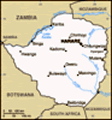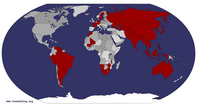Advertisement
Published: January 29th 2008
The South African woman working in the British Embassy in Pretoria, who had shockingly bad English despite being employed to represent our Queen and country, handed me my brand spanking new British passport - 32 crisp blank pages of opportunities lay before me. I could now once again visit almost any of the magnificent countries in this world and discover new and forward thinking attitudes. Let's go to Zimbabwe instead, I thought.
For a few seconds I wondered whether I should visit Zimbabwe at all. I knew there would be no issues from a safety perspective, but the moral arguments were whether my dollars would be funding the regime. But if I knew anything about the current political situation in Zimbabwe - which I don't much - then it's that the people are being crippled by the lack of tourism in the country. Tourists and travellers are seeking alternative paths since Bobby Mugs squeezed his grip on power. But I had met and talked to many Zimbabweans in South Africa and they all talked with enthusiasm about how beautiful their country and people are. So I thought I'd go make up my own mind on it all.
I was
soon starting to regret that decision when I was in a 3 hour queue at Zimbabwean immigration and customs. First they were checking every single item entering the country, then they slapped a whopping $55 USD visa on me. Just for being a British citizen. Have we done something to upset the regime here? But I was saving that amount 4-fold by travelling through Zimbabwe instead of flying over it, so it was an easier pill to swallow. I thought there may be a strong anti-British sentiment in Zim and I thought I was going to have to pretend to be German, but this wasn't the case at all. Which was a relief as I don't speak nein German.
I arrived in Bulawayo early next morning. Coming from a latte frappachino lifestyle and a Western media mentality, I was expecting to discover a desperate nation on its knees. It's true that all the shops are empty of food, the water is no longer drinkable, petrol is scarcer than a white farmer and hyper-inflation has hit exponential proportions (50 quid got me 140 million Zim dollars, which I needed to carry in a shoe box because the highest denomination was
200,000 dollar notes - ie. 700 notes). The banks are struggling to issue new currency quick enough to keep up with inflation. The train fares doubled overnight when I was in Bulawayo - I could have bought a return ticket to Victoria Falls, used it one-way and sold the return leg for a profit the next day. But in the face of all this chaos and hardship, the Zim people are carrying on with a smile and grace. I had less people asking me for money than in any other country I have visited this year (and I don't mean 2008), including Britain. To be honest though, it's not money that they need, it's food. I cannot emphasise enough just how desperate the food situation has become. Every single food shop is closed as the shelves are bare. The markets are selling a small range of fruit and veg at incredible prices - 1 million dollars for an orange. The people fortunate enough to be able to cross the borders come back with hundreds of loaves of bread and gallon loads of petrol, all of which finds its way onto an ever-expanding black market. I had come stocked with tins
of Spam, baked beans, a box of crackers and a load of dried soup. It was more like I was going for a trip to the MIR spacestation than visiting a country that was, until recently, one of Africa's success stories. So how did it come to this?
The Great Zimbabwe empire was the hub of trading in Southern Africa for many centuries. Then, as with the rest of Africa, it became colonised. Key in this was the British entrepreneur Cecil Rhodes, and Rhodesia was named in his honour in 1895. The land was distributed amongst the whites and so began the colonial era. Rhodesia vied for independence in the 1960's but it took another 20 years of bloodshed and sanctions before it was finally granted. Robert Mugabe has led the country ever since and as his power grew he started introducing more and more controversial measures. The most heated being the Land Reform programme. Arable land has been forceably removed from white farmers and redistributed to black workers. More often than not they do not have the skills to produce sustainable crops and so agriculture production has plummeted. In parallel to this, fixed-elections, state-organised violence, anti-gay campaigns and
AIDS denial have all led to further international sanctions and accelerated Zimbabwe's state of decline.
My first full day in Zimbabwe got off to the surrealest of starts. There I was walking back from Bulawayo train station (for a train that I couldn't board because it had been derailed outside of Bulawayo for 2 days), when a woman runs past screaming. Nothing too surreal there you might think, but this particular woman was on fire. Then behind her was a whole crowd of men trying to get her to stop running so they could smother the flames. Finally one of them rugby tackled her to the ground and loads of topless men suffocated the flames with their T-shirts. As soon as she was flameless, everyone just upped and walked away like they'd just swatted a fly or something just as mundane. I didn't feel it was appropriate to ask her to pose for a smouldering photo, so carried on past to the bus station. As I mentioned, petrol is at a premium in Zim, so taking any sort of road vehicle is costly. So decision made, I'd keep on cycling through Africa until I got bored. The infrastructure still exists and the road from Bulawayo to Victoria Falls is quite a smooth track with a number of places to stop off and set up camp. The nearer you get to Victoria Falls, the more amenities are available. At the last town before the Falls I even managed to find a small bootleg bar with a pool table, live Premiership football on TV and cold 1 million dollar beers. It was the best million dollars I've ever spent. The locals were all very friendly and took me under their wing. There was Lucky, Innocent, Prosper, Shorty, among others. It was like meeting the Seven Dwarfs and I was Snow White - or So White. In fact I hardly saw a single other white face as I travelled through Zim, until I reached the town of Victoria Falls.
Part of the reason for travelling is that I wanted to see life on earth as others see it. I wouldn't say I contributed anything of any worth to the people of Zimbabwe, other than get a first hand observation of the reality of life on the ground. And the reality is stark.
Victoria Falls is the town on the Zimbabwean side of the eponymous Victoria Falls. Recently declared one of the official 7 natural wonders of the world, I should have been more excited than I was. But maybe I am becoming a bit complacent of waterfalls. Nonetheless I was there, so did the obligatory tour. They are impressive, I cannot lie, but I think I annoyed the hell out of the rest of the tour group by making belittling comments about how I preferred Iguazu or Kaieteur or Angel Falls.
The next morning I crossed the Zambezi River to the Zambian side of the Falls. The crossing itself is rather spectacular as you pass over the Old Livingstone Bridge directly in front of the Falls to Zambian immigration. Another African border-crossing, another ordeal. I had put forward a request for a visa waiver, since yet again the British get stung a massive $60 USD for entry. This is more than double the rest of the EU who pay just $25, with the exception of Ireland who are granted a free visa. We've clearly pissed off our former colonial oppressees - get over it! - and I don't know what the Irish have done to get such favours. For some reason the rest of the world loves the Irish. It's either that they helped with the local road building or that they are united by a common loathing of the English. The Zambian immigration office had conveniently lost my visa waiver application - although if I paid them a few dollars towards cleaning expenses they would probably be able to find it. But if I had anything in my favour it was spare time, so I just sat and waited and got in the way of everybody. 3 hours later it turned up and I was on my way to Livingstone.
Livingstone in Zambia is the sister town to Victoria Falls in Zim, but the neighbouring town's fortunes could not be more contrasting right now. Victoria Falls' troubles are Livingstone's gains. The town is booming with toursists, half of which would otherwise be in Zim. Plus there is a constant stream of vehicles coming across from Zimbabwe to fill up their trucks with fuel and food.
I found the falls on the Zambian side less impressive than from the Zimbabwe side, and all of a sudden felt a little guilty I'd been so dismissive the day before.
It was raining almost non-stop during my time in Zambia, especially around the Zambezi Valley. One big shock I have had in this part of Africa is how green the countryside is. It is now rainy season in sub-Saharan Africa and the landscape is awash with lush vegetation., nothing like the stereotypical middle-Africa image.
But the rain is a mixed blessing - both for myself trying to ride a bike and to a lesser extent for the hundreds of thousands of people made homeless by the floods along the Zambezi valley. I was camping besides the Zambezi in Livingstone and the waters rose 3 metres overnight. Livingstone itself can absorb such dramatic swells but I heard that further downriver in Mozambique it has been pretty devastating.
Zambia has big distances between the major cities with little of interest in between. From Livingstone I headed up to the capital, Lusaka, and then eastwards to Malawi and its capital, Lilongwe (pronounced "L-long-way", which is exactly what it is on a bicycle from Cape Town).
Advertisement
Tot: 0.132s; Tpl: 0.011s; cc: 14; qc: 64; dbt: 0.0668s; 1; m:domysql w:travelblog (10.17.0.13); sld: 1;
; mem: 1.2mb









